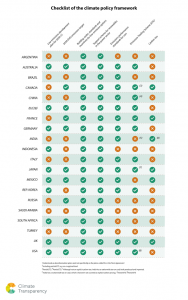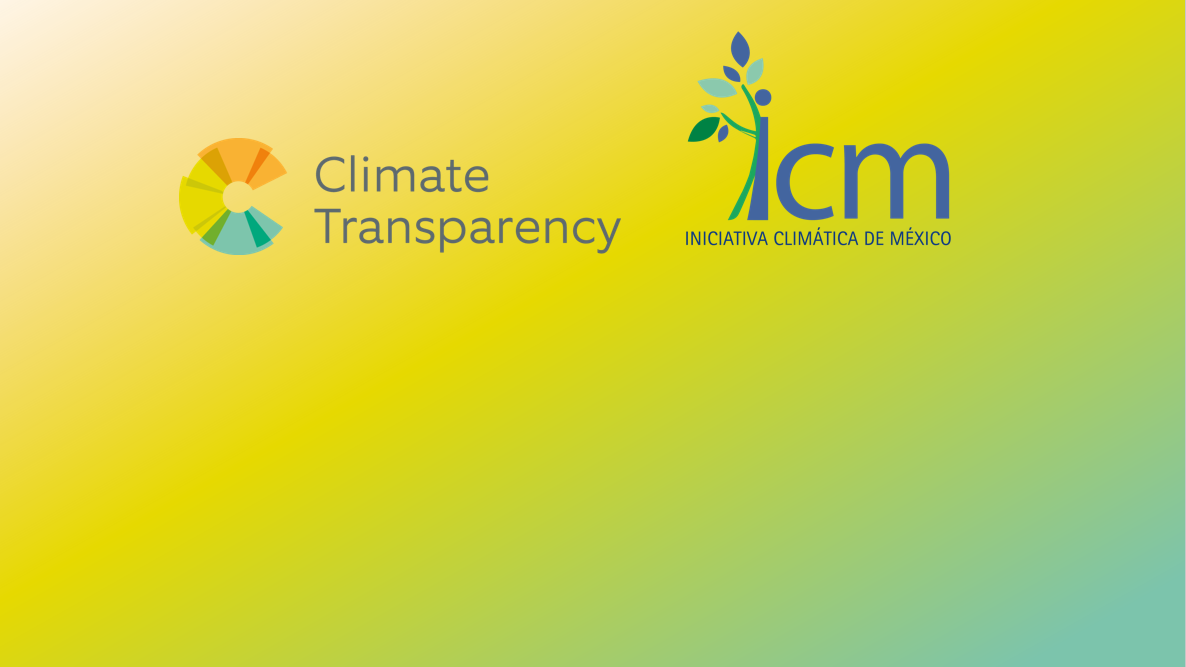Climate Policy Framework
G20 countries have increasingly introduced climate policies, showing growing awareness around the need for climate action and its benefits.
Important policy instruments are codes, standards and incentives for low-emissions options in the building sector, support schemes for renewables in the power sector, emission performance standards for cars, emission trading schemes (ETS) and carbon taxes.
With the exception of Argentina and Saudi Arabia, all G20 countries have introduced instruments for energy efficiency improvements in the building sector and emission performance standards for cars. Emission Trading Schemes (ETS) are in place in Australia, Canada, China, EU countries, Japan, South Korea, and parts of the United States. Canada, France, Japan, Mexico and the UK make use of a carbon tax to reduce their emissions. All G20 states have developed support schemes for renewable energy in the power sector.
So far, only half the G20 countries have low-emission development plans for 2050, or are planning to develop them. Eleven of the G20 states have put forward a 2050 GHG emissions reduction target.
No country has yet implemented “long-term low greenhouse gas emission development strategies” as called for in Art. 4.19 of the Paris Agreement. Even though some countries like Germany have started to develop such a plan, at this point it is impossible to state which countries are in the process of doing so.
According to the CCPI, the G20 policy performance shows a wide spectrum of good and poor performers:
- At the international level, France’s role in COP21 and in working for the Paris Agreement received high marks. Experts lauded Germany for pushing a decarbonisation agenda among the G7.
- Mexico and China were also praised for their international activities.
- Experts rank China and India highly for their national policy work.
- Poor performers in both national and international evaluations include Argentina, Australia, Canada, Italy, South Korea, Saudi Arabia and Turkey.
- In Argentina, weak requirements and controls in the industrial sector, and missing funding for renewable energy promotion led to a poor performance.
- Australia is one of the countries, which requested that the UNFCCC not publish the mandatory data submissions of its GHG emissions for the most recent year.
- Despite an overall poor ranking, Canada’s constructive role in the run-up to COP-21 in Paris was reflected in an improved evaluation of its international climate policy performance in the last edition of the CCPI.
- Italy lacks a coherent climate and energy policy and has played a very passive role in the EU climate policy.
- South Korea’s score has drastically decreased in the latest CPPI evaluation as the government plans to build 20 new coal-fired power plans.
- Saudi Arabia strongly defends its fossil fuel interests and has only made limited effort to promote climate action at the national level.
- Turkey lacks effective policies as well as supervision and reporting mechanisms.
Intended Nationally Determined Contributions
In the run-up to the Paris climate summit, all G20 states submitted Intended Nationally Determined Contributions (INDCs), indicating their planned climate actions. According to the Climate Action Tracker, the INDCs go beyond current G20 member state policies and, if fully implemented, do result in lower emissions. However, current G20 INDCs are inadequate to limit global warming below 2°C, let alone 1.5°C. Emission reductions foreseen in the INDCs cover only 15% of the reduction needed for moving to a 2°C trajectory. In other words, to keep within a 2˚C trajectory, the G20, as a whole needs to increase its 2030 climate action six times more than the plans on the books today. For the Paris Agreement, it would have to take even stronger action.







